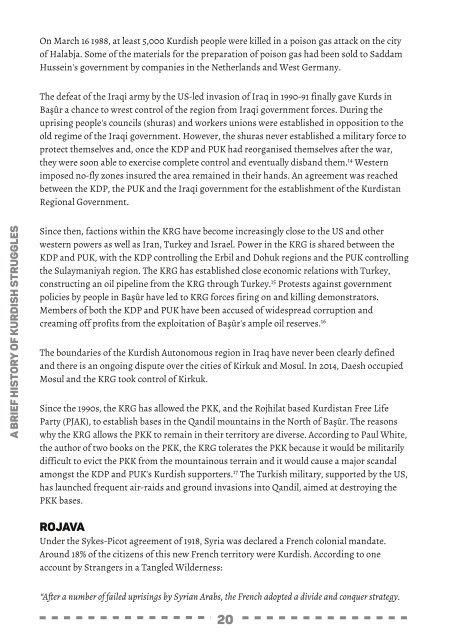STRUGGLES
Struggles-for-autonomy-in-Kurdistan
Struggles-for-autonomy-in-Kurdistan
You also want an ePaper? Increase the reach of your titles
YUMPU automatically turns print PDFs into web optimized ePapers that Google loves.
On March 16 1988, at least 5,000 Kurdish people were killed in a poison gas attack on the city<br />
ofHalabja. Some ofthe materials for the preparation ofpoison gas had been sold to Saddam<br />
Hussein's government by companies in the Netherlands and West Germany.<br />
The defeat ofthe Iraqi army by the US-led invasion ofIraq in 1990-91 finally gave Kurds in<br />
Başûr a chance to wrest control ofthe region from Iraqi government forces. During the<br />
uprising people's councils (shuras) and workers unions were established in opposition to the<br />
old regime ofthe Iraqi government. However, the shuras never established a military force to<br />
protect themselves and, once the KDP and PUK had reorganised themselves after the war,<br />
they were soon able to exercise complete control and eventually disband them. 14 Western<br />
imposed no-fly zones insured the area remained in their hands. An agreement was reached<br />
between the KDP, the PUK and the Iraqi government for the establishment ofthe Kurdistan<br />
Regional Government.<br />
a brief historyof kurdish struggles<br />
Since then, factions within the KRG have become increasingly close to the US and other<br />
western powers as well as Iran, Turkey and Israel. Power in the KRG is shared between the<br />
KDP and PUK, with the KDP controlling the Erbil and Dohuk regions and the PUK controlling<br />
the Sulaymaniyah region. The KRG has established close economic relations with Turkey,<br />
constructing an oil pipeline from the KRG through Turkey. 15 Protests against government<br />
policies by people in Başûr have led to KRG forces firing on and killing demonstrators.<br />
Members ofboth the KDP and PUK have been accused ofwidespread corruption and<br />
creaming offprofits from the exploitation ofBaşûr's ample oil reserves. 16<br />
The boundaries ofthe Kurdish Autonomous region in Iraq have never been clearly defined<br />
and there is an ongoing dispute over the cities ofKirkuk and Mosul. In 2014, Daesh occupied<br />
Mosul and the KRG took control ofKirkuk.<br />
Since the 1990s, the KRG has allowed the PKK, and the Rojhilat based Kurdistan Free Life<br />
Party (PJAK), to establish bases in the Qandil mountains in the North ofBaşûr. The reasons<br />
why the KRG allows the PKK to remain in their territory are diverse. According to Paul White,<br />
the author oftwo books on the PKK, the KRG tolerates the PKK because it would be militarily<br />
difficult to evict the PKK from the mountainous terrain and it would cause a major scandal<br />
amongst the KDP and PUK's Kurdish supporters. 17 The Turkish military, supported by the US,<br />
has launched frequent air-raids and ground invasions into Qandil, aimed at destroying the<br />
PKK bases.<br />
Rojava<br />
Under the Sykes-Picot agreement of1918, Syria was declared a French colonial mandate.<br />
Around 18% ofthe citizens ofthis new French territory were Kurdish. According to one<br />
account by Strangers in a Tangled Wilderness:<br />
“After a number offailed uprisings by Syrian Arabs, the French adopted a divide and conquer strategy.<br />
20


